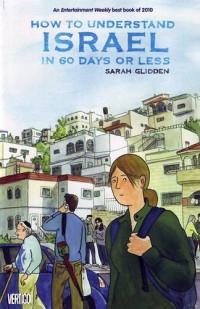Who am I to judge someone else’s holy site?
 How to Understand Israel in 60 Days or Less
How to Understand Israel in 60 Days or Less
by Sarah Glidden
Despite the grandiose title, this is the account of a small, albeit important, step in one person’s attempt to understand the complex situation surrounding Israel and Palestine. Told in comic-book style, it combines journalism and memoir to great effect.
Sarah Glidden is a “cultural Jew”. Raised in America by largely non-religious parents, her own politics being liberal and left-leaning, she has always tended to side against Israel, feeling it to be the political “bad guy”. A combination of a wish to understand, a hope to be proven right and the promise of a free holiday encourage her to sign up for a Birthright Tour. These trips, funded by the Israeli government and private sponsors, are open to Jews from around the world to show them the country that they can choose to move to if they so wish.
Sarah travels with her friend Melissa, another cultural Jew who is more earnest than Sarah in her attempts to learn about Israel without pre-judgement. Melissa’s upbringing was even more secular than Sarah’s, so Judaism itself is strange to her, but she is eager to learn and often frustrated by Sarah’s one-track mind: to every experience, every talk, Sarah asks “but what about the Arabs?”.
“What does it mean to live in disputed territory? Do you just ignore the controversy and try to live your life like normal? Or does it define you? Either way, this isn’t the warmest of places when it comes to urban planning. The coldness could be deliberate. In the event that they have to return this land to Syria, would anyone really miss it?”
I completely understand Sarah’s frustration that she is not getting the information that she wants, but what she does start to see is the complexity of it all. She has a simplistic black-and-white picture in her head that is being exploded piece by piece every time she speaks to a sympathetic Israeli, every time her cry of “propaganda!” is acknowledged as correct.
The simple watercolour art allows Glidden to add details of the culture and landscape, but also to show in people’s faces the emotional effects of the Birthright Tour, particularly on herself. It also adds an appropriate vagueness to the maps that open each chapter.
“I suppose if I believed in God, I would be crying and praying for it [the Western Wall] too. But this place that makes pilgrims cry is also the fulcrum to the whole conflict. So much blood… But who am I to judge someone else’s holy site? It feels almost like an act of violence to become angry at a place considered inspiring and divine to millions of people.”
This feels like a very honest account. At most points on the tour Sarah confesses to feeling strangely at home – far more so than Melissa – and it’s not a feeling she had expected to have. Then she steps outside of the Jewish Quarter in Jerusalem and is immediately lost and bewildered and on edge. She mocks other members of the tour group for being moved by rousing speeches and films, but is so moved by the Hall of Names at Yad Veshem that she barely eats or speaks the rest of the day.
Despite Sarah’s intentions, she only gets the barest glimpse at any sort of Palestinian “side” so this remains in some ways a one-sided account, but it does reveal the human complications of every possible route forward. It’s uncomfortable, to admit that the “bad guy” and “good guy” both come in every shade of grey and that to blindly be for or against a whole country is absurd, so the book ends in an uncomfortable place, but it’s an important lesson.
Published 2010 by DC Comics.
Source: Excelsior comic shop, Bristol.